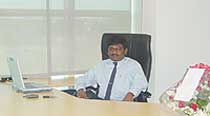Maximum quality
By Chennai: | 08 Apr 2002
If the facility size, vis--vis Qmaxs Rs 6-crore turnover, fails to impress you then the companys client list is sure to intrigue you. At a time when Chinese products are invading Indian markets, Qmax ships its automated test equipment (ATE - used to locate faults in populated printed circuit boards [PCB] and semi-conductors) to Chinese defence establishments.
Defence establishments in India, Malaysia, Korea, Taiwan and Thailand use Qmaxs ATEs. So do space, aviation and telecom players in India, the US, Malaysia, France, the Philippines and the UK. Adding one more feather in its overfilled cap is the Rs 1-crore order from the Philippines-based IDT for semi-conductor production line ATEs. IDT manufactures around 14,000 units per hour.
 This is a more challenging and lucrative line for us. For manufacturers it saves cost as well as reputation in terms of rejects at their client end, says Qmax director S R Sabapathi, the brain behind the companys awesome track record. An electronic engineer from Madurai Kamaraj University, Sabapathi, 44, predicts that a worst phase awaits the repair segment market, while the demand for ATEs for the production line will pick up. PCB prices are coming down but complexities in them are increasing. So people have this tendency of replacing faulty PCBs rather than repairing them.
This is a more challenging and lucrative line for us. For manufacturers it saves cost as well as reputation in terms of rejects at their client end, says Qmax director S R Sabapathi, the brain behind the companys awesome track record. An electronic engineer from Madurai Kamaraj University, Sabapathi, 44, predicts that a worst phase awaits the repair segment market, while the demand for ATEs for the production line will pick up. PCB prices are coming down but complexities in them are increasing. So people have this tendency of replacing faulty PCBs rather than repairing them.
On the other hand demand from the defence sector will continue to remain at the current pace, as it will work out cheaper to repair a component than waiting for replacement. The IDT order is expected to gain us entry into other global giants like Intel and AMD, he says.
Known widely among PCB and semi-conductor manufacturers, this SSI is beating world leaders like Teradyne, UK, in the global market. We are agile because we are small and have the necessary technical expertise. This is unlike many others in India who have to depend on their principals technical expertise, reasons Sabapathi. Qmax is an abbreviated form of Quality Maximum, my fathers mantra. Sabapathi derives inspiration from his father, a radio technician who assembles transistors in Kumbakonam, a small town in Tamil Nadu. After securing his electronics engineering degree, Sabapathi joined Bush India to troubleshoot complex digital and analogue PCBs. Later he joined Patni Computers, Mumbai. For sometime I was posted in Ahmedabad, where, after cursory manual checking of faulty PCBs, I used to mark out the problem components, he recalls. His diagnosis, in a tricky area that required the use of oscilloscopes, multimetres and diagnostic instincts, invariably proved right.
Like any other talented Indian professional seeking greener pastures abroad, Sabapathi flew to Singapore to join DataPrep in 1982. DataPrep had a large facility for maintaining various computer systems and it also undertook repairing a large number of IBM PC motherboards. It was a time when computer motherboards used to cost around 30 per cent of the full machine.
The backlog was high and it was then I hit upon the idea of designing a small instrument that plugs into the motherboard and points the faulty component in minutes, he recalls. His invention, which reduced his labour and increased the companys output, did little to increase his own bank balance.
It was then that his marketing colleague (Qmax managing director and CEO) Robert Ng, also an engineer, nudged him to start an independent outfit. Spurred by the entrepreneurial fire, which has always been in his blood, Sabapathi found the idea interesting. (In fact, the $3-billion Teradyne was also founded by two friends, in the sixties).
Mobilising some money from Quek Sim Pin, a major shareholder in the Lityan Systems group, the duo promoted Proteq Technologies in 1985. When the company started making profits the major shareholders sold the company to Acma Electrical Industries, another Singapore-based group. Ours was a high-value, low-volume product company. When the new owners wanted Proteq to sell other consumer products, Robert and I decided to float our own company, says Sabapathi.
Investing Singapore $2 lakh each the duo promoted Qmax Technologies, with the Singapore government contributing half a million Singapore dollars towards equity. Twenty eight per cent of the equity is contributed by venture capitalists, while Sabapathi and Ng hold 36 per cent each in the company.
To take advantage of the technical pool and low labour costs that India has, Qmax Technologies promoted Qmax Test Equipments, a 100-per cent export-oriented unit, in 1993 in Chennai. The company was initially housed in three different rented premises.
After an initial launch of low-end products Sabapathi decided to cater to the high-end market with new equipment. Based on the configuration the high-end equipment cost was anything between Rs 2 crore and Rs 5 crore, says Qmax regional manager V Vijayakumar.
With sales picking up Sabapathi decided to build the present massive facility at Shollinganallur at an outlay of Rs 4 crore. From two persons we are now a family of 100 members. Today Qmax is recognised as a global player.
What next? Next year we plan to launch testers for computer CPUs. Currently computer manufacturers are doing just mock-tests and there is no equipment that tests the entire CPU and memory at the same time. This is the reason why even new PCs hang suddenly, he says.
In 1996 Qmax was granted US and UK patents for developing the Bus Cycle Signature method for real-time testing of CPU-based boards. This is a significant step as it now enables Qmax to provide a test solution for those with a need to test PCBs with CPU and custom ICs under in-circuit conditions.
The industrious Sabapathi, meanwhile, travels between Singapore and Chennai, while his wife Manimekalai and two children (Varun, 14, and Vaishnavi, 11) are based in Singapore. An avid photographer, Sabapathis focal lens are now aimed at launching CPU testers that will be launched in a few months time.



















